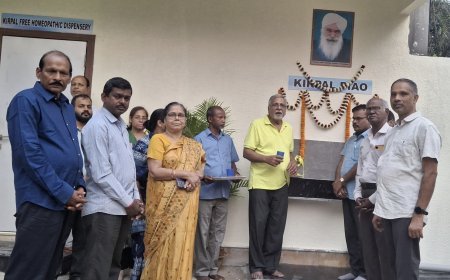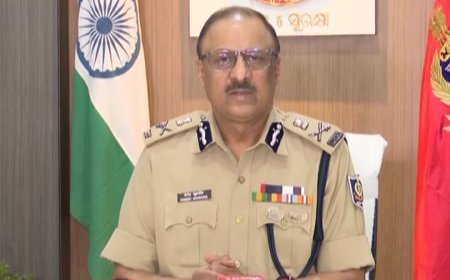The Ravenshaw University Debate: A Name Change or Structural Reforms for Global Recognition?

By
Sanjay pattnayak
The recent suggestion by Union Education Minister Dharmendra Pradhan to change the name of the 156-year-old Ravenshaw University in Cuttack has ignited a fiery debate across Odisha. The university, named after British bureaucrat Thomas Edward Ravenshaw, holds a prestigious place in the state's educational history. However, Pradhan’s idea, though expressed as a "personal thought," has sparked protests from students and raised questions among political circles, particularly the opposition Biju Janata Dal (BJD) and Congress, which have sought clarification from Chief Minister Mohan Charan Manjhi.
This debate, however, seems to overshadow critical questions: does changing the name of a university have any real impact on improving its global standing or academic quality? Ravenshaw University currently ranks 261st in India and 5330th globally, with notable achievements in research and contributions from distinguished alumni. Yet, it is far from breaking into the top 100 global institutions. The question then arises: what are the true shortcomings of our universities, and what needs to be done to bring them onto the world stage?
The Shortcomings of Indian Universities
Indian universities face several deep-rooted challenges that prevent them from attaining global recognition. Some of these issues include:
1. Inadequate Research Infrastructure: Despite having talented students and faculty, Indian universities often lack the cutting-edge research facilities that are necessary to foster innovation and high-quality publications. Research funding is also a significant issue, with universities relying heavily on government grants, which are often insufficient or misallocated.
2. Faculty Quality and Retention: Indian universities struggle with recruiting and retaining top-quality faculty. Professors and researchers are often burdened with administrative duties, limiting their ability to focus on academic work. Additionally, bureaucratic red tape discourages international scholars from contributing to the Indian academic system.
3. Rigid Curriculum and Teaching Methods: While global universities are continuously updating their curricula to match the needs of the rapidly changing world, Indian institutions tend to stick to rigid and outdated teaching methods. There is little room for interdisciplinary learning, creative thinking, or real-world applications, which are key to producing graduates who can excel in a global environment.
4. Global Collaboration and Exposure: Indian universities also fall short in building strong partnerships with leading global institutions. This limits student and faculty exchange programs, collaborative research, and the overall international exposure that is crucial for improving global rankings.
What Needs to Change?
Simply renaming Ravenshaw University or any other institution will not alter its global standing or academic output. What is needed is a structural overhaul of India’s higher education system. A few key areas for reform include:
1. Increased Investment in Research: Indian universities need more financial support, not just from the government but from the private sector as well. Public-private partnerships could help improve research facilities, encourage innovation, and contribute to producing high-impact research papers that will elevate the university's global rankings.
2. International Collaborations: It is essential to build strong relationships with top global institutions, not just for student exchange programs but for collaborative research, joint degrees, and faculty exchange. Such efforts will enhance the international footprint of Indian universities and help them integrate into the global academic community.
3. Faculty Empowerment: Hiring and retaining top-quality faculty should be a priority. Professors should be given the autonomy to design courses, lead research projects, and engage in global academic discourse. Their focus should shift from administrative duties to research and teaching excellence.
4. Curriculum Modernization: The current educational framework needs to be reformed to promote critical thinking, creativity, and interdisciplinary approaches. The curriculum should reflect the demands of the 21st century, preparing students to thrive in a highly competitive global market.
Why Not Seek Help from Global Experts?
India is home to many global experts, including Sundar Pichai, the CEO of Google, who hails from Tamil Nadu and studied at the Indian Institute of Technology (IIT) Kharagpur. As someone who has thrived in the global tech space, Pichai’s insight could be invaluable in understanding what makes a university excel globally. There is no harm in seeking input from successful Indian expatriates who have studied at premier Indian institutions and have gained global recognition.
Moreover, a committee composed of Indian diaspora academicians, who understand the global academic landscape, could offer constructive recommendations for improving the infrastructure, teaching methods, and global collaborations of Indian universities. Union Ministers and bureaucrats, while influential in policymaking, may not have the expertise required for educational reforms at this scale.
Conclusion: The Need for Holistic Reforms
The debate over renaming Ravenshaw University serves as a distraction from the core issue—how to elevate India’s universities to the global top 100. To truly enhance the global standing of our universities, structural reforms, increased investment in research, faculty empowerment, and curriculum modernization are the way forward.
By focusing on meaningful reforms rather than symbolic gestures, Indian universities can aspire to achieve global excellence. And perhaps it’s time to tap into the wisdom of Indian diaspora experts, like Sundar Pichai, whose contributions could be key to the transformation of India’s higher education system. Like Dharmendra Pradhan’s proposal, this, too, is my “personal idea.”








































